Democratic debate in Las Vegas: Under fire from Democrats, Clinton fires at Republicans
- Share via
By the numbers
The first Democratic debate of the 2016 presidential campaign season is over:
- Hillary Clinton, Bernie Sanders, Lincoln Chafee, Jim Webb and Martin O'Malley faced off
- What Hillary Rodham Clinton and Bernie Sanders needed to do to win
Climate change doesn't get short shrift from Democrats
When it comes to climate change, there was a night-and-day difference between the Democratic debate in Las Vegas and the last Republican showdown at the Reagan library in California.
Republicans often doubt the science behind climate change, plus they've questioned or opposed steps to battle the problem.
"I am not in favor of any policies that make America a harder place to live or work," Sen. Marco Rubio of Florida said at one point in the GOP debate.
But when Democrats took the stage on Tuesday, they eagerly addressed the issue. Hillary Rodham Clinton, for example, talked about her experience as secretary of State trying to track down Chinese diplomats to buttonhole them on the issue at an international conference.
At no point did the contrast with Republicans become more clear than when the Democratic candidates were asked what they thought was the most serious threat in the world today -- a question that might have been seen as an opening to discuss terrorism or other geopolitical challenges.
But Martin O'Malley, the former Maryland governor, brought up climate change, saying it "makes cascading threats even worse."
And Sen. Bernie Sanders of Vermont took it a step further.
"If we do not address the global crisis of climate change ... the planet that we're going to be leaving our kids and our grandchildren may well not be habitable," he said.
In short
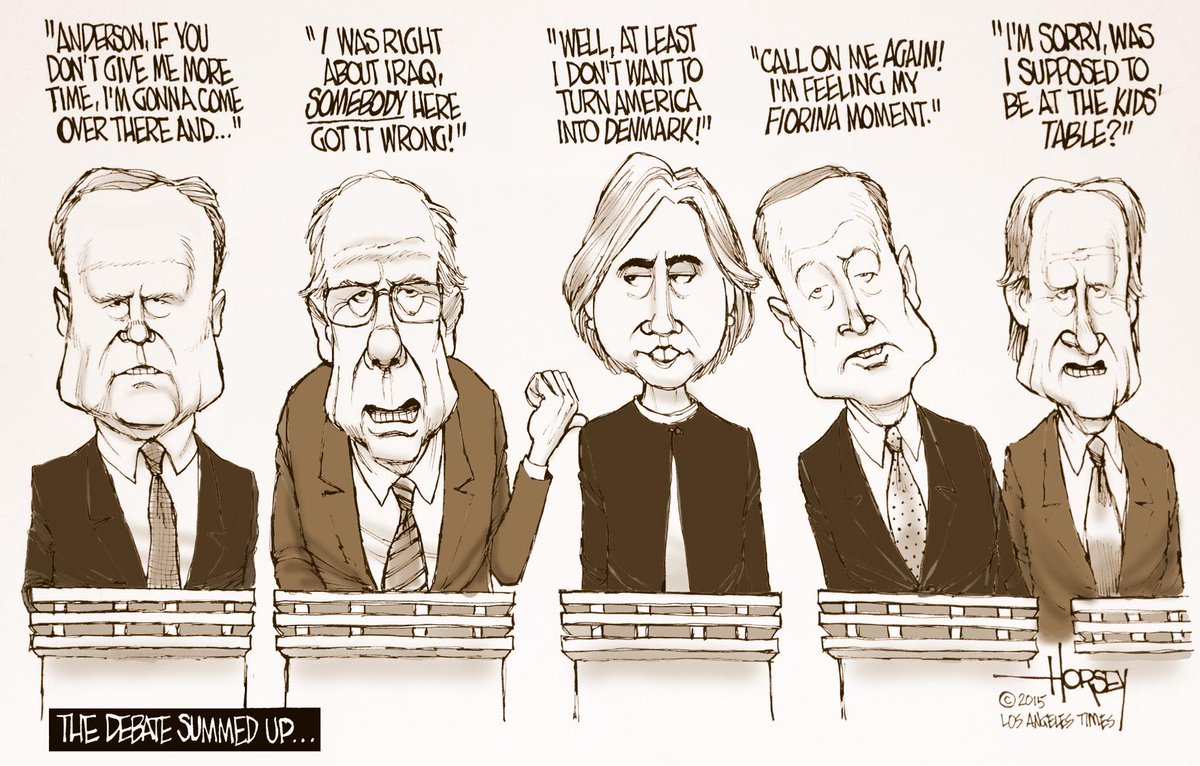
(David Horsey / Los Angeles Times)
Sign up for the Essential Politics newsletter
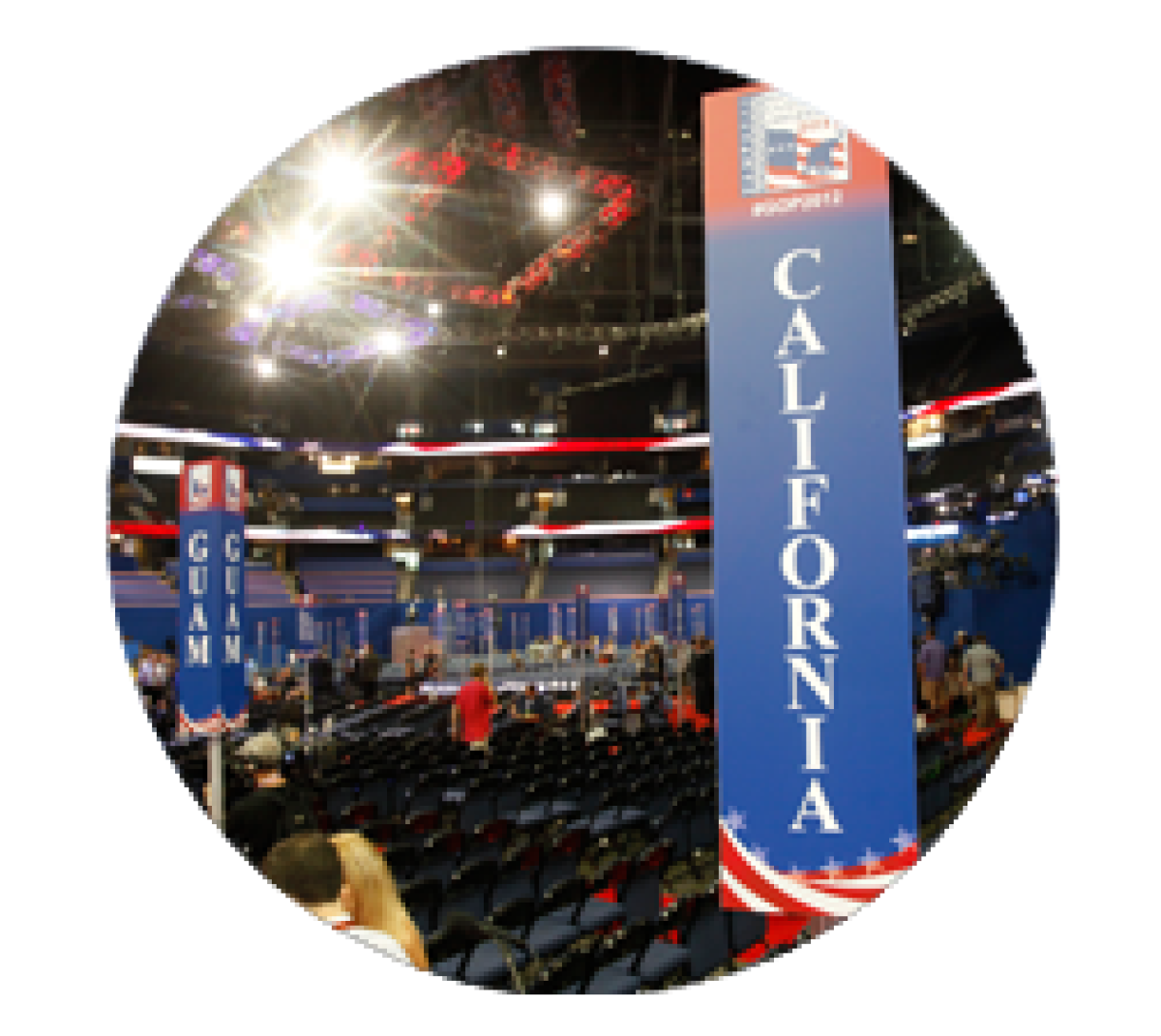
A daily email blast to showcase the best from our political teams covering the presidential campaign, California politics and governing in Sacramento. It will be one vibrant hub for everything you want to know about what's happening in politics
How has California's family leave policy been going?
In advocating for paid family leave, Hillary Rodham Clinton praised California, which in 2002 passed the nation's first law requiring such leave.
The state's law provides eligible employees with replacement pay -- up to 55% of their usual earnings -- for up to six weeks.
How has that been working out?
In 2011, The Times reported , researchers said the downside for businesses was minimal and thousands of families had their working lives improve.
And last year, The Times' editorial board pushed for such a policy to go nationwide. Citing a study by the Center for American Progress, it said paid family leave keeps workers in the labor force who might otherwise drop out or be forced to quit their jobs. It yields additional economic gains through lower healthcare expenses, reduced recruitment and retraining, and improved lifetime earnings for female workers.
Which enemies are you most proud of?
'We don't have to be defined by the email scandal'
Hillary Clinton has struggled for months to move beyond the investigations into her use of a private email server while secretary of State, but she finally hit the right notes in explaining the situation during Tuesday's Democratic debate. She declared with conviction that she had made a bad decision but also that the congressional committee targeting her had gone out of bounds.
"This committee is basically an arm of the Republican National Committee," she boomed, to the approval of the crowd. She then noted, as she has before, that Rep. Kevin McCarthy of Bakersfield all but conceded political motives during a recent interview with Fox News.
"Everybody thought Hillary Clinton was unbeatable, right?" McCarthy told Fox. "But we put together a Benghazi special committee. A select committee. What are her numbers today? Her numbers are dropping. Why? Because she's untrustable. But no one would have known that any of that had happened had we not fought to make that happen."
(The fallout from McCarthy's comment included his withdrawal from the race to succeed Rep. John A. Boehner as speaker of the House.)
Clinton invoked McCarthy's gaffe Tuesday night, saying, "It is a partisan vehicle, as admitted by the House Republican majority leader, to drive down my poll numbers."
She is due to appear before the House committee on Oct. 22. At Tuesday's debate, she said she would answer the committee's questions about the email situation, but on the campaign trail would focus on substantial issues.
When CNN debate moderator Anderson Cooper pushed back, Clinton received a boost from rival Bernie Sanders.
"I think the secretary is right," he said, a line that solicited booming cheers and applause in the debate hall. "The American people are sick and tired of hearing about your damn email."
Sanders shouted that voters were concerned about the collapse of the middle class and the disintegration of campaign finance laws. "Enough of the emails," he said. "Let's talk about the real issues."
As the crowd cheered, Clinton thanked Sanders and walked over to his lectern to shake his hand.
Lincoln Chafee was harder on Clinton. He said "credibility is an issue" for anyone wanting to be a world leader.
Cooper asked Clinton whether she wanted to respond, but she felt no need. The crowd was on her side.
"No," she said, and the crowd cheered again.
Martin O'Malley said he saw no need to dwell on the emails, noting that the Democrats were having a debate -- finally -- and that had allowed the discussion to shift to more substantial issues. Then he took a swipe at Democratic Party officials, who are limiting the number of debates to six.
"Now that we are finally having debates, ," O'Malley said. "I see the chair of the Democratic National Committee here. Look how glad we are actually to be talking about issues that matter."
Bernie Sanders backs pot legalization, others more cautious
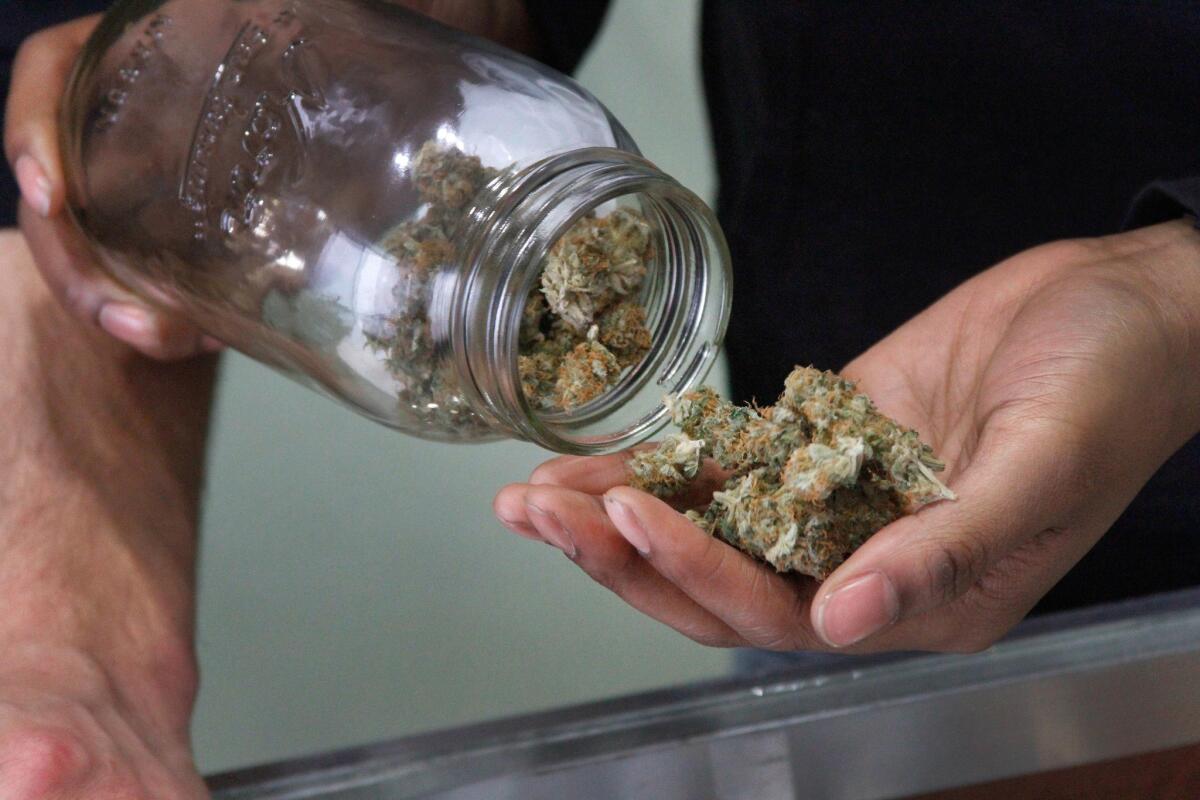
Bernie Sanders said he supports legalizing marijuana, tying his position into a broader critique of the country's criminal justice system.
"I have seen too many lives being destroyed over nonviolent offenses," he said.
Sanders made the remark when asked how he would vote on a Nevada ballot initiative next year.
Hillary Clinton was more cautious, saying she was not ready to take a position on broad legalization even though she supports making the drug available for medical use.
In general, all of the Democratic candidates would probably impose policies at least as permissive as those of the Obama administration when it comes to marijuana.
That is to say, they would all allow the states to continue the legalization experiment.
But so far they have embraced legalization with varying degrees of enthusiasm. Jim Webb has suggested that marijuana might be treated the same by the federal government as tobacco. On the other end of the spectrum is Clinton. She has been noticeably quieter, but she has affirmed that she believes the federal government should allow cities and states to continue with their legalization initiatives.
How the next White House manages the march toward legal pot in those cities and states, however, will shape the outcome of this social experiment.
They are struggling with existing federal laws that undermine their efforts. Almost no legal marijuana businesses, for example, are able to use banks, which under current law are subject to asset seizures and harsh penalties if they knowingly open accounts for companies engaged in selling what the federal government still classifies as one of the most dangerous narcotics.
Sanders has said some of those rules need to be relaxed. Martin O'Malley has tried to position himself as particularly open-minded on the issue, although on the question of federal legalization, he said last month: "I'm not there yet."
Lincoln Chafee is in a similar place. Chafee says he is keeping an open mind on federal legalization.
Sanders' campaign capitalizes on 'damn emails' line
Bernie Sanders' campaign has quickly capitalized on the Vermont senator's line that Americans are tired of hearing about Hillary Rodham Clinton's "damn emails."
In an email sent during the debate, Sanders' campaign said the presidential race should be about issues such as income inequality and climate change, not the scandal surrounding Clinton's private email server.
The email also urged supporters to donate to the campaign before Sanders stepped off the debate stage.
"If you're as fired up as we are about how things are going, make a contribution of $23.81 -- the average donation made to our campaign during the debate," the email reads.
Sanders has vowed not to raise money through super PACs, which he says are corrupting democracy.
Last month, Sanders' campaign said it had about $25 million on hand in the third quarter thanks to more than 1 million donations from about 650,000 contributors. In the previous quarter, Sanders raised $15.2 million.
Explore the money behind the campaigns
OK, speaking of campaign finance, more than $400 million has already been contributed in the 2016 presidential race.
See which candidates have raised the most, who the biggest donors are and more inside scoop on the huge amounts of money behind the campaigns.
Under fire from Democrats, Clinton fires at Republicans
Hillary Rodham Clinton spent plenty of time on stage defending herself against criticisms from her Democratic primary opponents.
But she also made sure to keep shifting attention back to Republicans.
During a question about immigration, Clinton paused the back-and-forth with the other candidates.
"There is such a difference between everything you're hearing here on this stage and what we hear from Republicans, who have demonized hard-working immigrants," she said.
By keeping the focus on Republicans, Clinton downplayed the more minor differences she has with her fellow Democrats. And it's a glimpse of how she would battle an opponent in the general election if she gets her party's nomination.
Edward Snowden: Traitor or hero?
What was Clinton aiming for with the 'woman president' mention?
There's still time for debate bingo
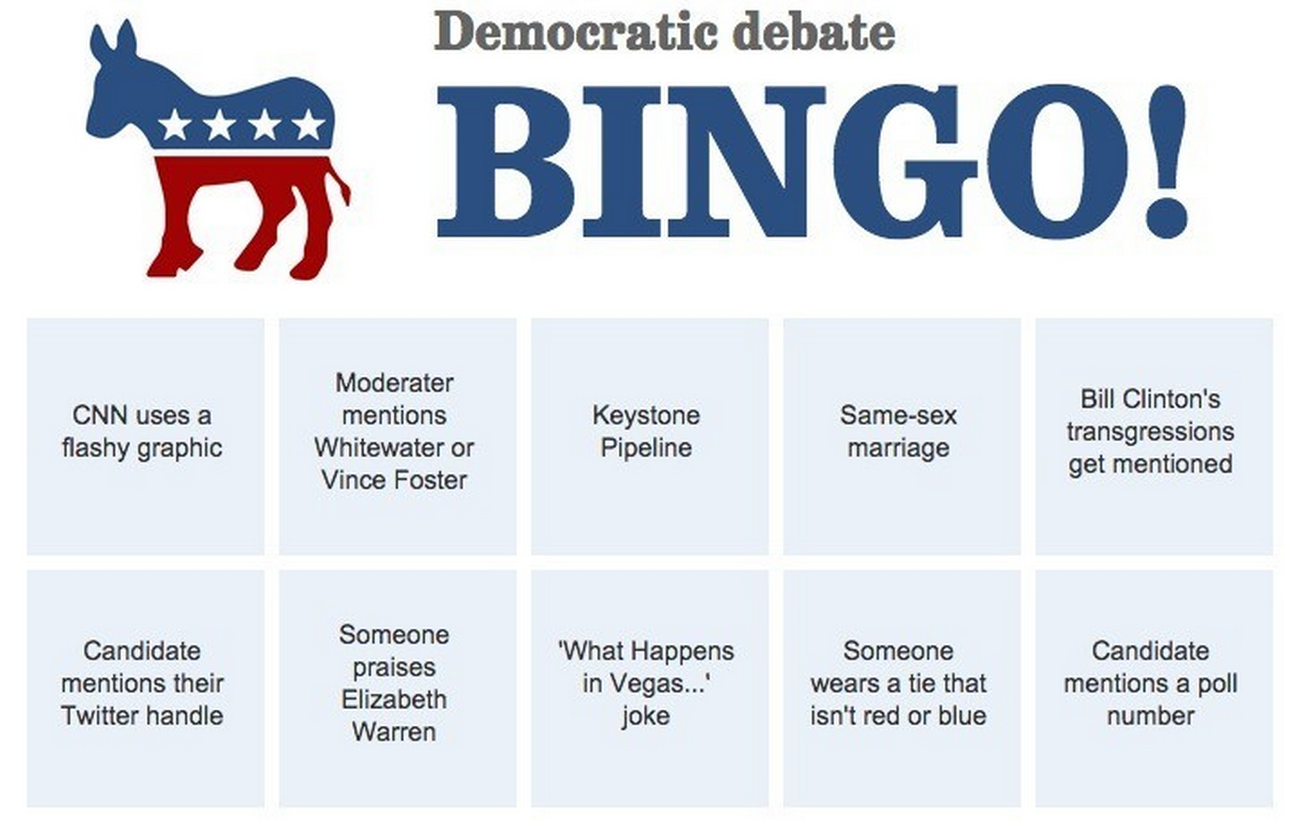
There's still time to follow along and play Democratic debate bingo. Click through for the full card. Get five in a row and you win!
Clinton: I was in the situation room, you weren't
Hillary Clinton took plenty of criticism for her foreign policy record -- amid persistent crises in Russia, Syria and elsewhere that are likely to dog the former secretary of State throughout the campaign.
Tonight, she offered a catch-all defense: I was answering the 3 a.m. phone call; you weren't.
"I spent a lot of time in the situation room going over some very difficult issues," she said.
She even leaned on President Obama, her former rival, to insulate her record. When her judgment was criticized for her vote to authorize the war in Iraq, she pointed to the fact that, despite her debate, Obama forgave her and named her secretary of State.
"He valued my judgment," she said.
The defense cuts across issues, and has the added benefit of linking her with a president who is still quite popular among Democratic primary voters. It's an argument that even if she makes mistakes, she has faced the real pressure of governance, unlike opponents who can attack without consequence.
It's directed primarily at Sen. Bernie Sanders, whose passionate rhetoric on economic and military issues has made him a favorite of the left.
But Clinton's defense will not insulate her from all attacks, particularly from those who believe too many of her positions are geared toward public opinion surveys. The attacks on her vote to authorize war in Iraq were some of the strongest of the night.
"People feel like a lot of our legislators got railroaded," said Martin O'Malley, the former Maryland governor, "by a war fever and by polls."
'Black Lives Matter'
The Black Lives Matter question at the Democrats' debate reprised a confrontation from the NetRoots Nation conference in Phoenix last July. Activists essentially took over the forum, chanting, "Black Lives Matter."
One activist stepped onto the stage, took the microphone and talked for much of Martin O'Malley's time.
At one point, O'Malley said, "Black lives matter, white lives matter, all lives matter." Protesters booed, and O'Malley later apologized for appearing to minimize black suffering.
The activists also challenged Bernie Sanders, who responded that he had spent 50 years fighting for civil rights. That didn't sit well with demonstrators either. It triggered a bit of Black Twitter irony with the hashtag #BernieSoBlack.
A strange defense from Chafee
The Glass-Steagall what?
In discussing the economy and big banks, the candidates brought up the Glass-Steagall Act. What's that?
It's a Depression-era banking reform law that was repealed in 1999 during the financial deregulation craze, and it's a symbol of how deregulation enabled the go-go financial activities that ended in tears with the 2008 financial crisis, as Times columnist Michael Hiltzik explains .
By the way, Hiltzik isn't convinced that reviving that particular law would be so helpful. To see his column, click "read more," below.
Clinton's tortuous path to opposing the Keystone XL pipeline

Hillary Rodham Clinton waited a long time to declare she is opposing the Keystone XL pipeline -- too long for the comfort of many environmentalists.
Stopping the proposed pipeline that would transport oil from the Canadian tar sands to the refineries on the Gulf Coast is a top priority for climate-change activists. They warn it would accelerate global warming by boosting fossil fuel production and undermining demand for renewable fuel projects.
Sen. Bernie Sanders has long been one of the most vocal opponents of the pipeline, helping lead efforts in the Senate to block its approval. Former Maryland Gov. Martin O'Malley declared months before he launched his White House bid in March that he would fight the project.
Clinton sidestepped Keystone until a few weeks ago. She repeatedly said her role in reviewing the project while secretary of State would make it inappropriate until the Obama administration made a decision on the application. In 2010, when Clinton was in the administration, she suggested she was inclined to approve the project. When Clinton unveiled her renewable-energy plan months ago, it made no mention of the pipeline or how she would deal with it.
Finally, in Iowa last month, Clinton said she could no longer wait to state a position on the pipeline. Activists were confronting her about it everywhere she went. "I oppose it," she said at a forum in Des Moines. "I don't think it is in the best interest of what we need to do on climate change." She said the pipeline project had become a "distraction" that "interferes with our ability to move forward" with a green energy agenda.
Rivals accused her of wobbling, and Clinton defended herself during the debate.
"I never took a position on Keystone until I took a position on Keystone," she said.
Let's shake on it
In one of the most memorable moments of the debate so far, Bernie Sanders did something "that might not be great politics" and told front-runner Hillary Rodham Clinton that "the American people are sick and tired of hearing about your damn emails."
"Thank you," Clinton replied. "Me too!"
Sanders stressed that voters are more interested in pressing concerns such as improving the economy.
"Enough with the emails," he said.
The pair shook hands as Clinton laughed and thanked Sanders again.
What Black Lives Matter wants to see from 2016 candidates
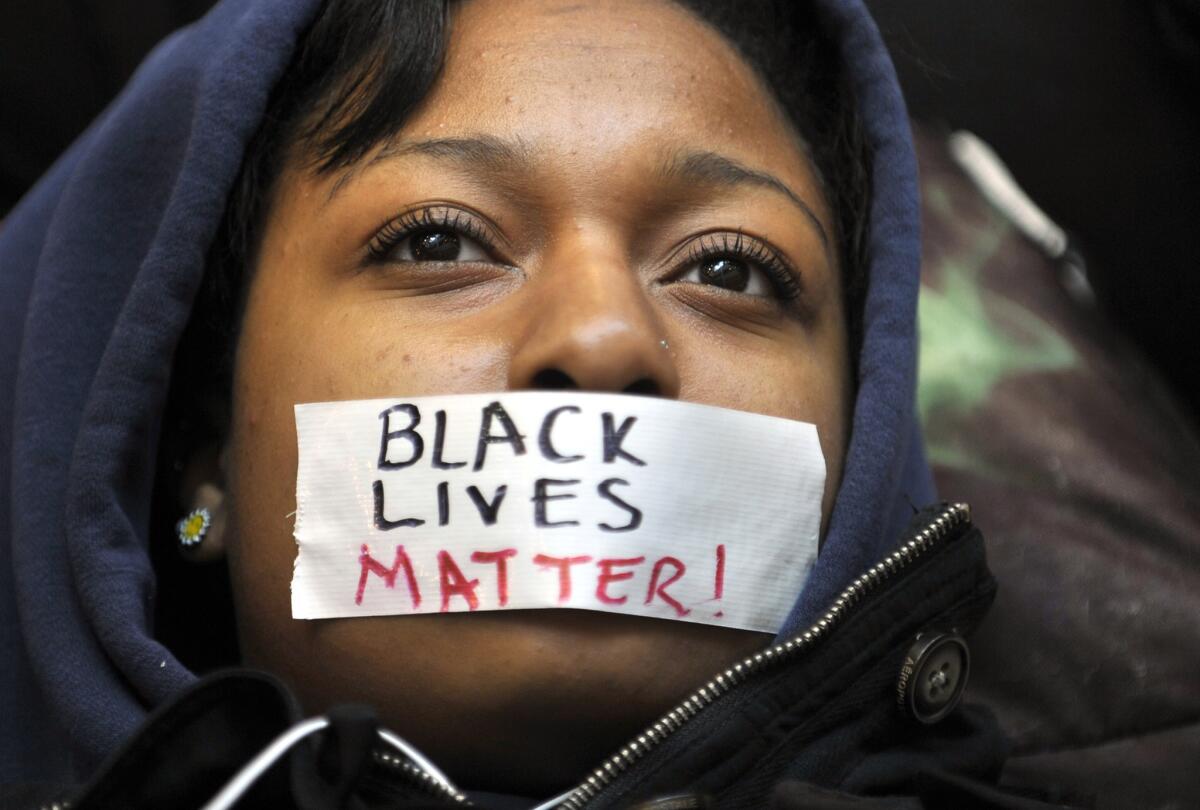
Democratic candidates were asked a question that has been a fault line in American politics -- "Do black lives matter, or do all lives matter?"
Videos of police killing unarmed black men over the last two years have sparked a nationwide movement that's seeped into the 2016 presidential election.
For several months, members of the Black Lives Matter movement have sought to make their voices heard on the campaign trail.
As presidential hopefuls traverse the country, they've been confronted by demonstrators who would like to see the candidates put forward concrete proposals on issues that range from criminal justice reform to improved educational opportunities for minority communities.
While some Republicans have been targeted, it's mostly Democratic candidates who have had the most public showdowns.
Following an August rally in New Hampshire, Hillary Rodham Clinton met with members of Black Lives Matter, and tense exchanges ensued based on video footage.
The demonstrators challenged her on her past support for tough sentencing measures that they argued had resulted in unduly long periods of incarceration for black men.
"What in your heart has changed that is going to change the direction of this country?" one activist wanted to know.
"There has to be a reckoning, I agree with that," Clinton replied, according to a video of the closed-door encounter. She pointed to work she has done to improve the lives of minority children. "But I also think there has to be some positive vision and plan that you can move people toward," she said.
Last week, Clinton met with members of Black Lives Matter to discuss issues. Both sides lauded the meeting as productive.
In other instances, Bernie Sanders has been interrupted and forced to end events early.
Patrisse Cullors, a Los Angeles resident and cofounder of Black Lives Matter, told The Times in July the group plans to be a force throughout the 2016 campaign.
"We want to ensure that these candidates will actually deal with the issues that black people face," Cullors said. "The reality is that it's still not legal to be black in this country."
How Kevin McCarthy unintentionally helped Hillary Clinton
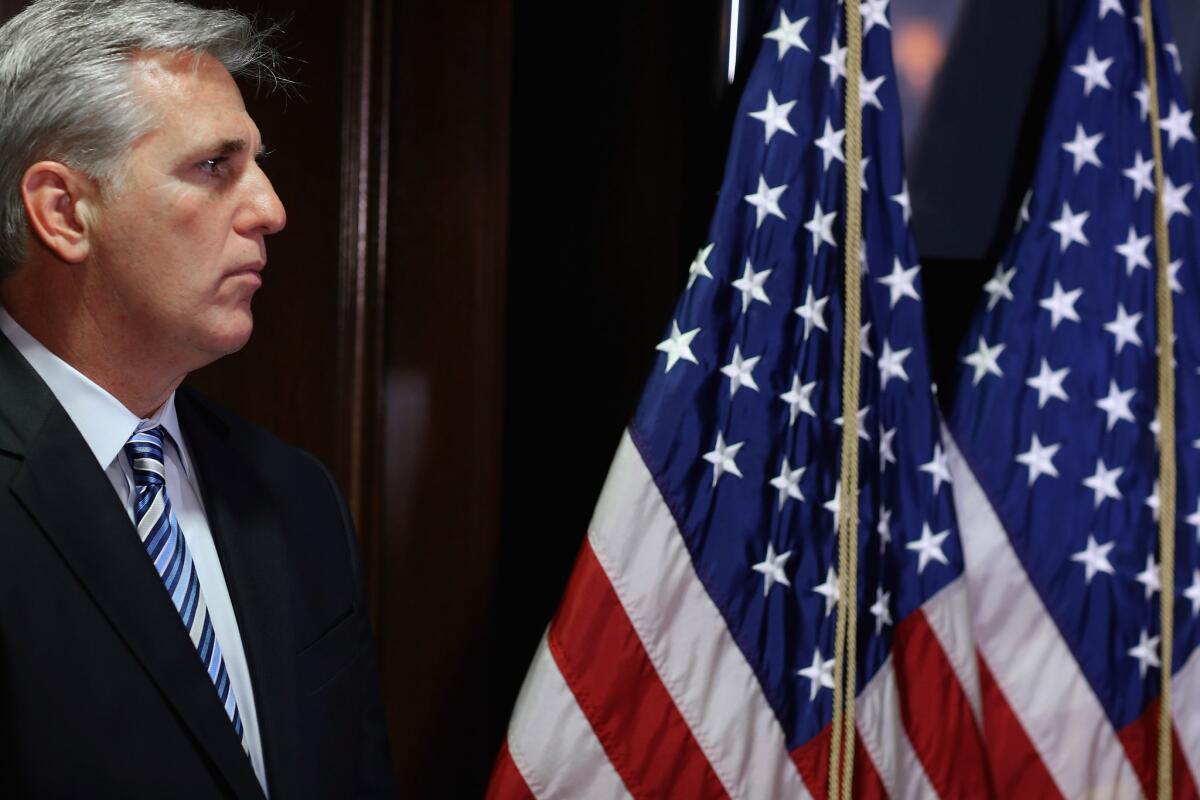
Rep.
House Majority Leader Kevin McCarthy may have struck out with fellow Republicans in his bid to become speaker of the House. But Hillary Clinton might want to send the Bakersfield Republican a Thanksgiving turkey this year.
McCarthy's statements bragging about the political damage that a House Benghazi committee inflicted on Clinton have become one of Clinton's chief talking points as responds to questions about her use of a private email server during her term as secretary of State.
During the debate, Clinton was beaming when she reminded the crowd of McCarthy's comments.
"I am still standing," she said proudly.
Republicans have long maintained that the committee established to investigate the 2012 attacks in Benghazi, Libya, that left four Americans dead is geared at seeking the truth about the incidents. But McCarthy recently suggested a political motive, something Clinton and other Democrats have long asserted.
"Everybody thought Hillary Clinton was unbeatable, right?" McCarthy said during a Fox News interview. "But we put together a Benghazi special committee. A select committee. What are her numbers today? Her numbers are dropping. Why? Because she's untrustable. But no one would have known that any of that had happened had we not fought to make that happen."
Oops. McCarthy apologized to fellow Republicans several times for the remarks, which have undermined their position. But it was too late. Not only did it contribute to his withdrawal from the race to become speaker, it also provided Clinton with some helpful backup as she faces questions about the email issue.
"When I hear a statement like that, which demonstrates unequivocally that this was always meant to be a partisan political exercise, I feel like it does a grave disservice and dishonors not just the memory of the four [lives] that we lost [in the Benghazi attack], but of everybody who has served our country," Clinton said on MSNBC shortly after McCarthy's gaffe.
Very informal sense of the watch party crowd
From the Regent Theatre in downtown L.A., where people are watching on the big screen and there is standing room only.
Perspectives on war
Issue of Iraq war puts Clinton on the hot seat
Clash on foreign policy
Does Clinton shift on the issues?
Hillary Clinton's ideology has been one of the biggest points of contention among Democrats since she entered the election.
Early in tonight's debate, as she faced questions about flip-flops amid attacks from the left, she gave one of the most succinct definitions of her views: "I'm a progressive, but I'm a progressive who likes to get things done."
The comment was central to her defense against Bernie Sanders, whose insurgent campaign has posed the biggest threat to her nomination.
Clinton has always positioned herself as a grinder, someone who is not afraid to do the hard work of government, in contrast to President Obama, Sanders and others who are either more inspirational or more ideological.
The "progressive who gets things done" comment is intended to insulate her from those who worry she is too moderate because of her contributions from Wall Street, her working relationship with Republicans in the Senate, or the centrist governing philosophy of her husband, former President Bill Clinton. The part about getting things done is intended as a contrast to Sanders, whom she is casting implicitly as too pure to be effective.
Expect to hear variations on that theme throughout the evening.
Clinton and O'Malley team up against Sanders on guns
Sanders' mixed record on gun control
Hillary Clinton said Bernie Sanders is "not at all" tough enough on guns. Although Sanders may be to the left of Clinton on many issues, that's not always the case on gun control.
In the House, Sanders voted against the Brady bill, the landmark background check legislation that President Bill Clinton signed into law in 1993. According to PolitiFact, Sanders voted against various versions of the bill as it weaved its way through Congress, keeping his word to rural-state voters in Vermont.
More recently, though, Sanders backed gun control measures in the aftermath of the Newtown, Conn., school shooting. He voted for a 2013 amendment to ban assault weapons and another to expand background checks. Both of those measures, however, failed to advance. Sanders has received failing grades from the National Rifle Assn.
During the debate, Sanders said he'd like to see expanded background checks and crackdowns on "straw man" purchasing.
Debate is going at a 'breathless pace'
Here are a few more high points from the last few minutes:
Bill Clinton tweets photo of himself watching the debate
Clinton's view of trade agreements has evolved over the years
Soon after the debate began, Hillary Clinton found herself defending her position on international trade.
On issues like Wall Street reform, the minimum wage and energy, Hillary Rodham Clinton has resisted taking positions that would align her fully with the Democratic Party's left-leaning base. But when it comes to trade, Clinton seemed to recognize that there was nothing to be gained from trying to take a more nuanced position on a major pact between the U.S. and 11 other Pacific nations.
"I don't believe it is going to meet the high bar I have set," Clinton told PBS last week of the proposed Trans-Pacific Partnership. "I am not in favor of what I have learned about it."
In a more lengthy statement released by her campaign, Clinton said that she still believed in the goal of a "strong and fair trade agreement in the Pacific as part of a broader strategy, both at home and abroad." She praised Obama and his administration for "the strides they made" in trying to improve its terms. "But the bar here is very high and, based on what I have seen, I don't believe the agreement has met it."
The full text of the trade deal has not yet been made public; President Obama, who has invested significant political capital in pushing Congress to support the agreement, has not yet given the final sign-off that would make its details public.
But Clinton also opposed legislation that passed in June that allows for expedited consideration of the final agreement. She questioned a so-called investor-state dispute settlement provision, which critics have dismissed as a secret tribunal that would benefit mostly big corporations. Clinton called it "an anti-Democratic process."
"There's always room to maneuver, and I think this is one of those times," she said in June, urging Obama to use congressional opposition to the deal as leverage with Pacific nations to demand better terms for American workers.
Clinton's critics have cast her opposition as a reversal of the position she advocated as secretary of State in Obama's first term, where she had a role in earlier stages of the negotiations. In 2012, she said the emerging deal would set the "gold standard" for open, free trade. And in her latest book, "Hard Choices," she noted that the accord was a key piece of the U.S. strategy toward Vietnam. She wrote that the deal, still being negotiated at the time, would be "important for American workers, who would benefit from playing on a more level playing field," and would "strengthen the position of the United States in Asia."
The trade issue is particularly dicey for Clinton, given the revulsion many Democrats -- particularly in the labor community -- feel toward the North American Free Trade Agreement that was passed during her husband's administration. And in her 2008 campaign she said that in hindsight, that agreement was a mistake -- a view she reiterated in a recent interview with NBC's Chuck Todd.
"You know, at the time, I thought NAFTA held out a lot of promise. But the fact that a lot of the so-called side agreements were not actually in the treaty, I thought was a problem," Clinton said. "It has turned out that I don't think we had enough of an enforcement mechanism in dealing with NAFTA."
Clinton noted in that interview that as a senator, she opposed the Central American Free Trade Agreement, or CAFTA, saying she "didn't think the lessons had been learned."
Clinton did not vote on a trade pact with Peru in 2007, as the campaign was in full swing, nor did other candidates serving in the Senate: Obama, Chris Dodd, Joe Biden and John McCain.
But it was NAFTA that was a major flashpoint between Obama and Clinton in 2008, particularly ahead of a key primary in Ohio.
In one of the more famous moments of that battle Clinton angrily lashed out at her rival for what she said were misleading mail pieces sent by his campaign misrepresenting her position. She accused him of employing tactics out of the Republican playbook
"Shame on you, Barack Obama," she said. "It is time you ran a campaign consistent with your messages in public." She invited him then to additional debates to fully discuss the issue.
"Meet me in Ohio," she said. "Let's have a debate about your tactics and your behavior in this campaign."
What Bernie Sanders means when he calls himself a democratic socialist
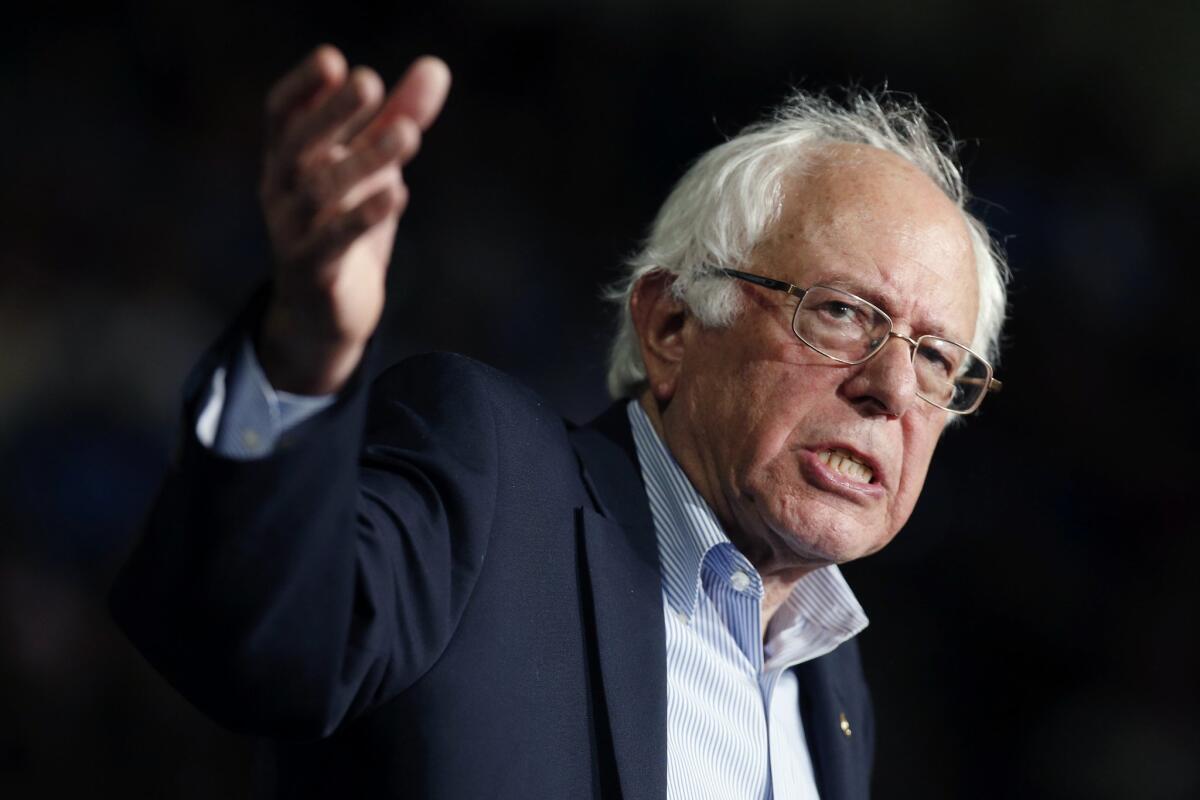
Democratic presidential candidate Sen. Bernie Sanders (I-Vt.) during a campaign rally in Springfield, Mass., earlier this month.
Sen. Bernie Sanders has been using the term socialist and democratic socialist to describe his political philosophy for decades, and he did so again tonight. His surprise victory as mayor of Burlington, Vt., in 1980 led to an increase in T-shirt sales: "Welcome to the People's Republic of Burlington."
Sanders does not disavow the term but can get grumpy when asked about it.
"Media gets hyped up about the word," he said in an interview published this year, "but most important is what we stand for."
To him that encompasses a range of economic issues embraced by the left flank of the Democratic Party, especially his frustration with the tax rates being paid by large corporations and the wealthy, which he considers too low. He would also like to expand Social Security and use other government tools to raise wages for the working class, which has made him a strong ally of labor unions.
Sanders, first elected to the House in 1990 and then to the Senate in 2006, is the longest serving independent member of Congress in history. He caucuses with Democrats, however, and is currently the ranking member of the Senate budget committee, making him a central player in articulating the party's positions on the economic issues.
Most politicians would be aghast if they were even asked whether they are capitalists. Not Sanders.
"No, I'm a democratic socialist," he said on "Meet the Press" this week.
Though he said he expects to win the nomination, he promised to support whoever emerges from the Democratic primary.
Early thoughts from the watch party
We're hosting a watch party at the Regent Theatre in Downtown L.A. Some early thoughts from the crowd, which appears to be substantially pro-Clinton and pro-Sanders.
Clinton starts with job issues
Sanders brings his energy
Webb and O'Malley introduce themselves
Sheryl Crow's performance of national anthem doesn't go over well
And away we go
Candidates weigh the odds on gaming support
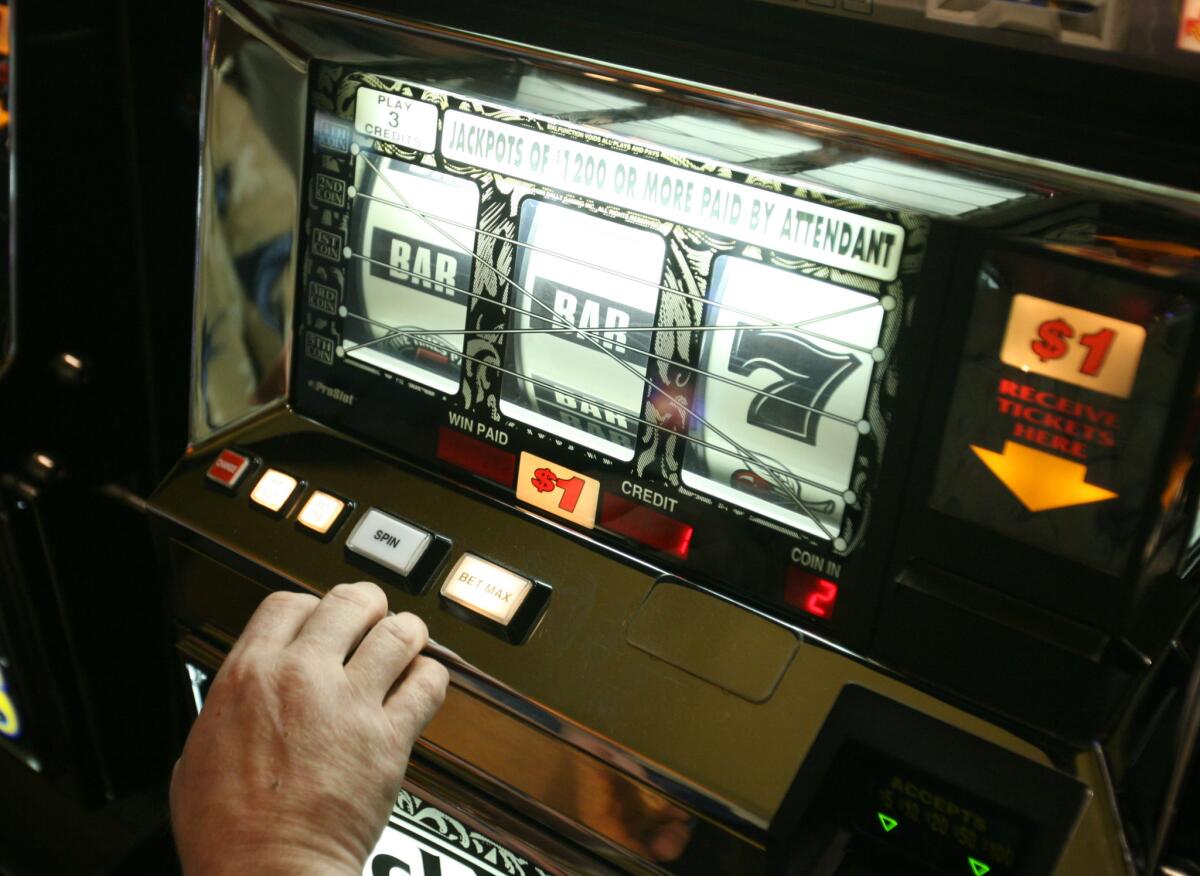
With Democratic candidates facing off in Las Vegas, will the town's biggest industry -- gambling -- be a topic for debate?
The candidates might be fine-tuning their views on the gaming industry, which now operates in 40 states across the nation.
"Gaming Votes" is the American Gaming Assn.'s first-ever initiative to nudge candidates from both parties to think broadly about this line of work. Casinos are now legal in the early caucus state of Iowa and the all-important swing states of Ohio and Pennsylvania, and support 1.7 million jobs nationwide. Casino moguls are big donors to presidential politics.
Watch for questions and answers about gambling. Because what happens in Vegas no longer stays in Vegas.
Vegas, baby
Times political cartoonist David Horsey is in Las Vegas for the debate. Here are some of his thoughts.
Hello, is this thing on?
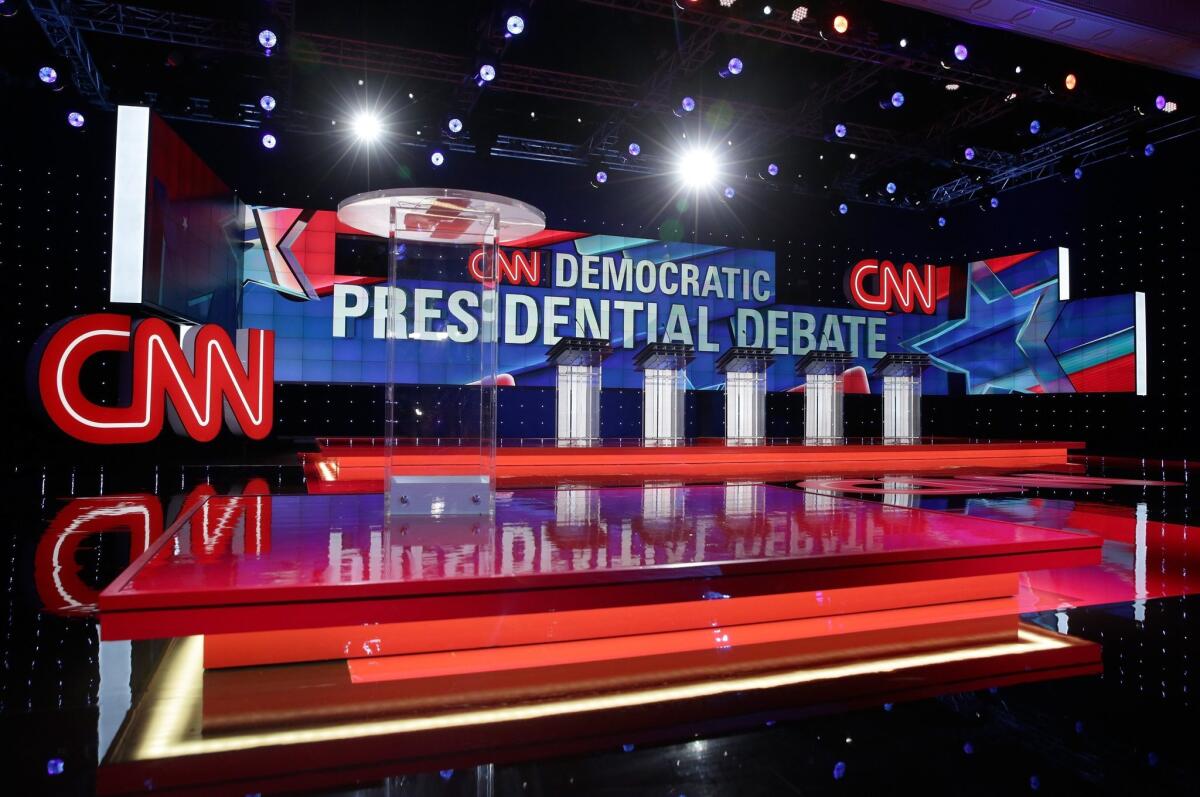
LAS VEGAS, NV - OCTOBER 13: A general view shows the stage during a walk-through before a Democratic presidential debate sponsored by CNN and Facebook at Wynn Las Vegas on October 13, 2015 in Las Vegas, Nevada. Five Democratic presidential candidates are scheduled to participate in the party’s first presidential debate. (Photo by Alex Wong/Getty Images) ** OUTS - ELSENT, FPG, CM - OUTS * NM, PH, VA if sourced by CT, LA or MoD **
Last month's Republican primary debate was CNN's most watched event , but tonight's debate between Democratic presidential candidates probably won't come close: More than half of registered U.S. voters don't even know about it, according to a new Reuters/Ipsos poll.
The poll of about 1,200 adults found that 57% of registered voters weren't aware of tonight's debate at the Wynn hotel in Las Vegas. Among Democratic voters, only 45% knew about it, while 16% said they had no idea at all.
About 40% of the Democrats polled said they were interested in their party's candidates; 45% said they were somewhat interested.
Republican presidential hopeful Donald Trump, who has grabbed the spotlight this campaign season, said Monday that he planned on watching tonight's debate but wasn't sure anyone else would -- because he won't be in it.
Only 37% of registered voters expect tonight's debate to be as entertaining as the Republican debates, and 33% expect it to be less entertaining. Just 29% expect it to be more entertaining.
Aside from Trump's absence, another factor is what is competing for at least some voters' attention: the fourth game of the Dodgers-Mets playoff series.
The White House said today that although President Obama is "certainly interested" in the first debate featuring the five Democrats aspiring to succeed him, it's not likely he'll watch the event "wire to wire" because of the game.
"There is some pretty good playoff baseball on tonight. So I would anticipate that he may be doing a little channel surfing," Press Secretary Josh Earnest told reporters.
Clinton and Sanders diverged on key votes in Congress
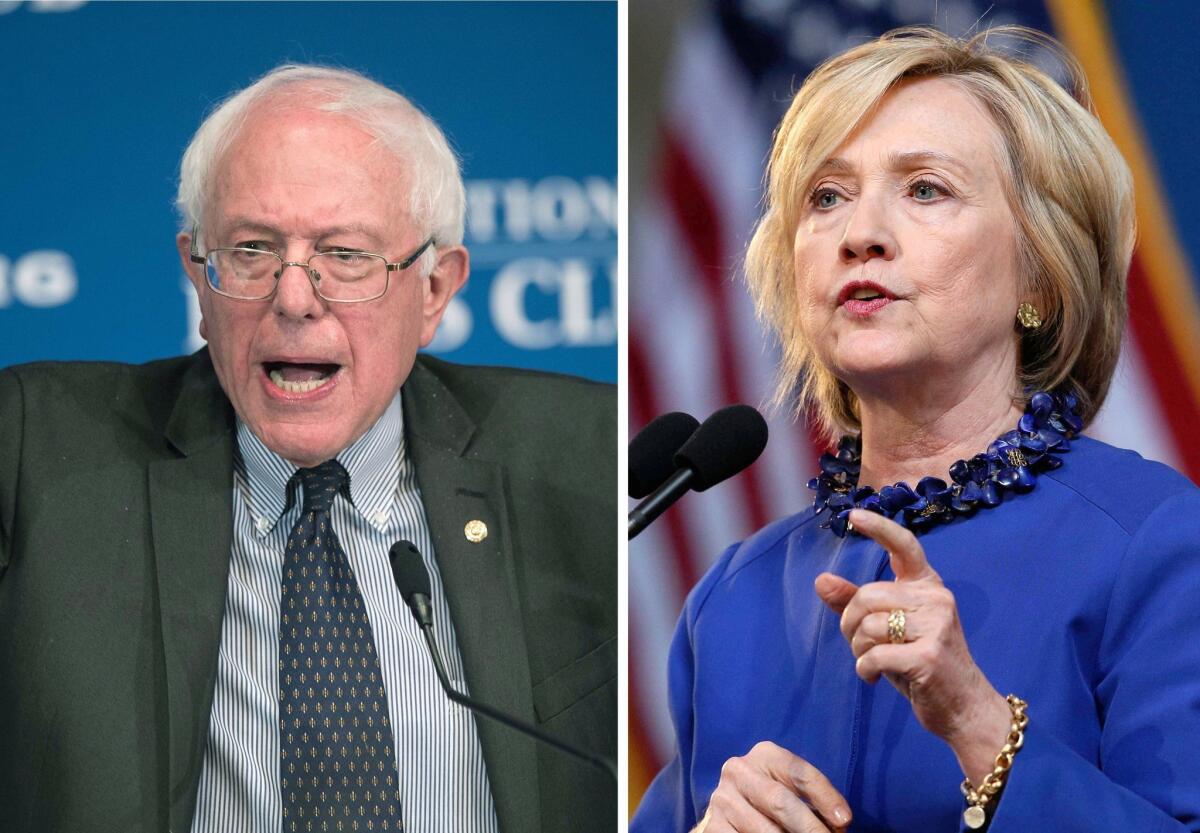
Democratic presidential candidates Sen. Bernie Sanders and former Secretary of State Hillary Clinton.
When Hillary Rodham Clinton and Bernie Sanders face off on the debate stage, look to see whether their history of political differences comes under the microscope. Here's a review of how they voted on some key issues in Congress.
Iraq war Oct. 2002: Authorizing the use of military force against Iraq
Clinton Yes
Sanders No
Patriot Act Oct. 2001: Authorizing enhanced government surveillance
Clinton Yes
Sanders No
Iraq war 'surge' Feb. 2006: A resolution opposed to sending 20,000 more troops to Iraq
Clinton Yes
Sanders Yes
Guantanamo Bay July 2007: No transfer of Guantanamo Bay detainees to U.S.
Clinton Yes
Sanders No
Wall Street Oct. 2008: The bank bailout under Troubled-Asset Relief Program
Clinton Yes
Sanders No
Tax cuts May 2001: Lower rates for the wealthy and others under President Bush's tax cuts
Clinton No
Sanders No
In Congress, the Democratic candidates turned few bills into laws
The Democratic candidates may boast of their accomplishments in Congress, but the record tells a more modest story. Here's a snapshot of their Capitol Hill careers, by the numbers.
Hillary Rodham Clinton
Years in Congress: Senate 2001-2009
Bills introduced: 713
Bills co-sponsored: 2,676
Authored bills that became law: 3
What they did: One named a post office, another designated a highway in honor of newscaster Tim Russert and a third established the Kate Mullany National Historic Site at the New York home of the 19th century laundry union labor leader.
Notable accomplishment: Worked across the aisle with Republicans on almost half the co-sponsored bills that became law.
Bernie Sanders
Years in Congress: House 1991-2006; Senate 2007-present
State: Vermont
Bills introduced: 775
Bills co-sponsored: 5,387
Authored bills that became law: 3
What they did: Two bills named post offices (one after civil rights legislator Thaddeus Stevens) and another approved an annual cost-of-living adjustment for veterans.
Notable accomplishment: Brokered a 2014 deal with Republicans after the VA backlog scandal to provide a new benefit allowing vets to see private doctors at government expense.
Lincoln Chafee
State: Rhode Island
Years in Congress: Senate 1999-2006
Bills introduced: 66
Bills co-sponsored: 882
Authored bills that became law: 0
Notable accomplishment: Before leaving the GOP in 2007, he was the only Republican senator to vote against authorizing the Iraq War. He became a Democrat in 2013.
James Webb
State: Virginia
Years in Congress: Senate 2007-2013
Bills introduced: 133
Bills co-sponsored: 530
Authored bills that became law: 1
What it did: Allowed Hotaru Nakama Ferschke, the Japanese wife of a Marine sergeant killed in Iraq, to apply for legal permanent residence in the U.S.
Notable accomplishment: Delivered the 2007 response to the State of the Union address.
Get ready for Democratic debate bingo
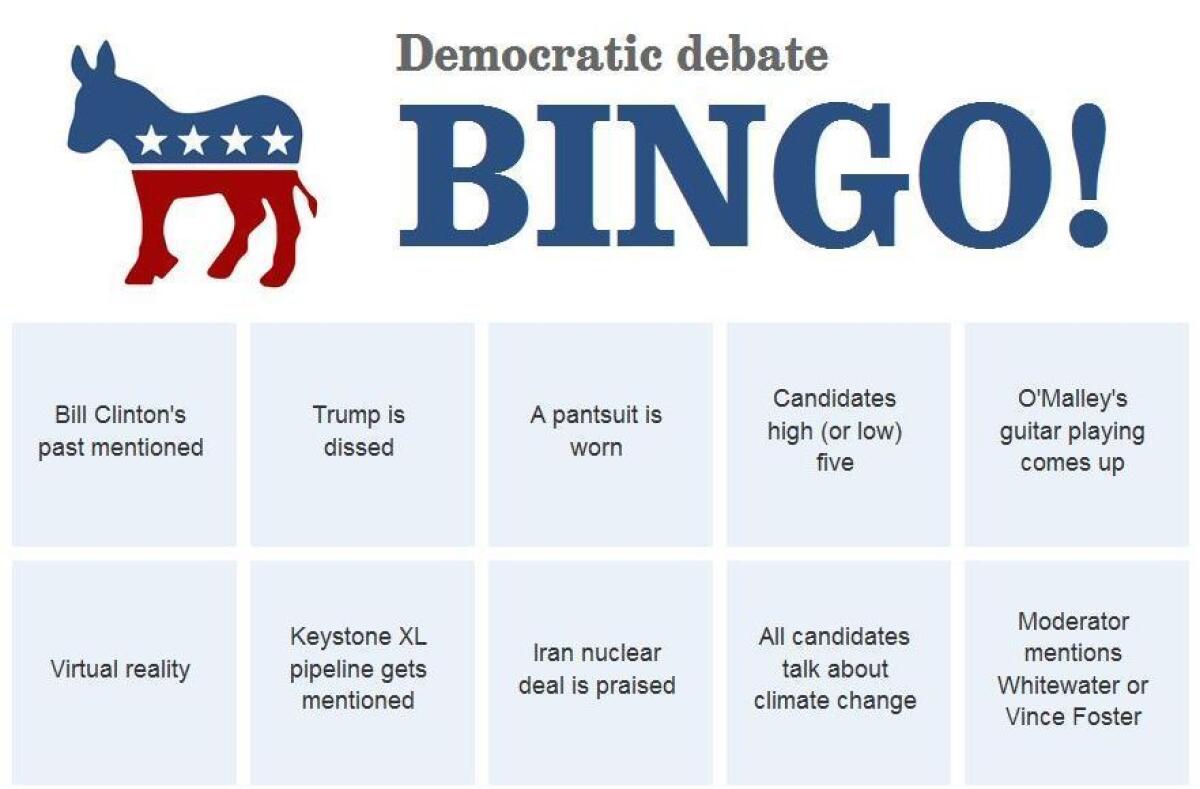
To further liven up what is sure to be an eventful debate, we've put together a bingo card based on things we have a hunch could happen. When one of them does, click on the corresponding square.

Get five in a row, you win!
Click through below to play or print out a copy.
Villaraigosa supports Clinton ahead of debate
Harry Reid: I am satisfied with six debates
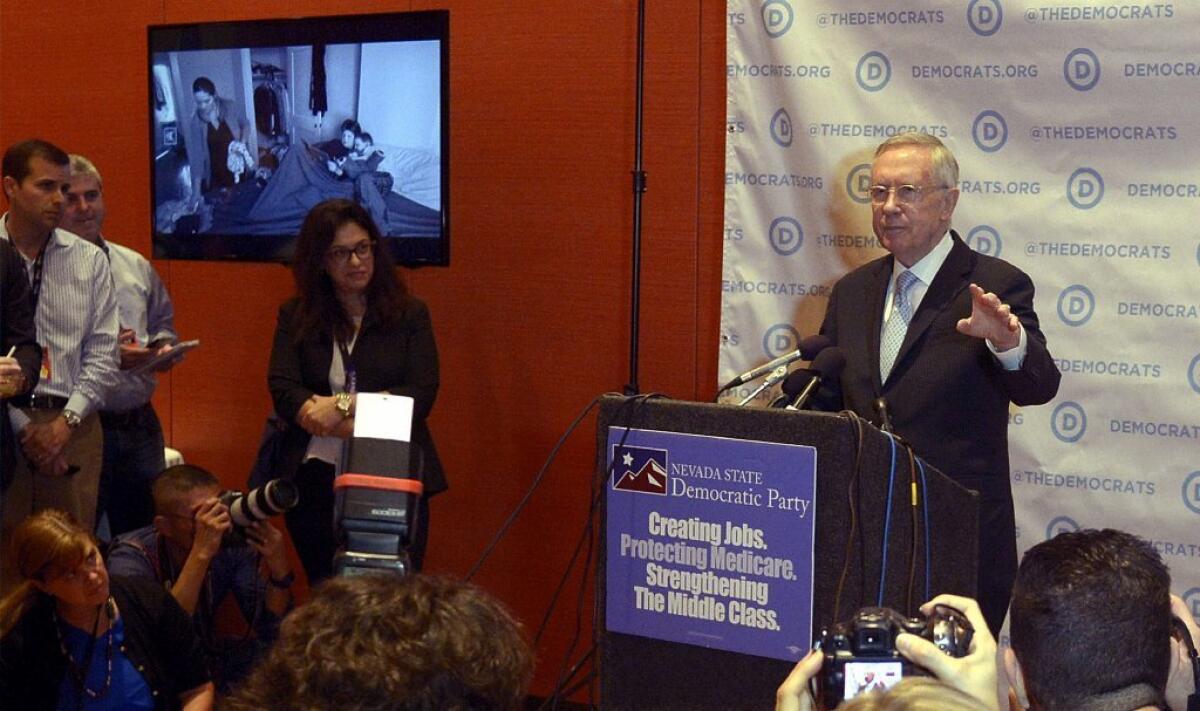
Senate Minority Leader Harry Reid, above, thinks six Democratic debates are plenty and insisted Tuesday that Vice President Joe Biden does not need his advice as Biden mulls a third presidential run.
"I am satisfied with six debates," Reid said in breakout room at the Wynn Hotel where Democratic presidential hopefuls will gather tonight for the party's first presidential debate. "Six debates is a lot of debates for the American people to listen to."
Some Democrats have criticized party leaders, primarily Chairwoman Debbie Wasserman Schultz, for sanctioning six debates -- far fewer than in past election cycles.
Reid, Nevada's senior senator who will retire next year after more than three decades in Washington, added that Biden does not need his advice on 2016.
"I'm the last to advise Joe of politics .... He doesn't need my advice. I'm looking forward to the debate tonight," Reid said.
Prior to taking questions, Reid offered a wry apology for comments he made earlier in the week complaining about New Hampshire as an early voting state.
"I was always terribly upset about how we were choosing our presidents. You go to New Hampshire. There are not any minorities there. Nobody lives there," he told the Washington Post at an event on the Las Vegas Strip.
Sen. Jeanne Shaheen (D-N.H.) called Reid's comments inappropriate and asked for an apology.
"New Hampshire is heavily populated and loaded with minorities," Reid said Tuesday in his apology.
Nevada, whose caucuses fall after Iowa's and the New Hampshire primary, is the first Western state to hold and early nominating contest.
Joe Biden may not be on the stage tonight, but he's on the air
Joe Biden's lectern is still waiting in the wings at the debate site in Las Vegas, but a new ad urging his candidacy is all over CNN today.
Brought to you by the folks at Draft Biden, the ad shows images of working people who seem to be struggling to make ends meet. A voiceover from a Biden speech features the vice president talking about how his parents struggled to provide for his family. A job is about more than a paycheck, he says, as a crowd cheers.
The ad ends with a black screen and the words "Joe, run."
It's a total turnabout from the ad the Draft Biden team put out on the Internet last week, a piece that focused on the tragedies and loss of Biden's life.
The VP sent word that he didn't like it, as my colleague Mike Memoli reported last week. He felt it tread on "sacred ground," an aide said.
The ad went away, and this one surfaced today.
Democrat vs. Democrat: Pre-debate debate about debates
The candidates aren't the only Democrats squaring off Tuesday, as members of the Democratic National Committee are having a feisty public feud over just how the debate season should unfold.
Rep. Tulsi Gabbard of Hawaii, a vice chair of the DNC, took her complaints to CNN and MSNBC, voicing concern that the six debates sanctioned by the DNC aren't enough for voters to really get to know the candidates.
Gabbard also objected to the fact that any candidates who decide to take part in non-DNC debates will be disinvited from the DNC debates -- a "policy of retribution" that Gabbard thinks is problematic.
"This is just wrong, in my view," Gabbard said in a morning interview on CNN, the cable channel hosting the debate. Gabbard said the policy was decided with "no consultation and communication," at least not with her.
But DNC Chair Debbie Wasserman Schultz says many party officials were consulted and that there is broad support for the six-debate set-up, partly because they "don't want to pull the candidates off the campaign trail over and over and over again."
In a separate interview with CNN Tuesday afternoon, Wasserman Schultz, a member of Congress from Florida, said that Gabbard is "quibbling about process" at a time when the focus should be elsewhere.
"You and I are now talking about Tulsi Gabbard instead of focusing on our candidates," Wasserman Schultz told CNN's Wolf Blitzer. Gabbard is talking about "process," she said, and about herself.
Gabbard says she was disinvited from the debate, Wasserman Schultz says that's not true. The pre-debate debate continues.
'SNL' to Donald Trump: Fire away
Donald Trump is returning to "Saturday Night Live," the show announced on its blog.
The Republican front-runner will host the Nov. 7 episode, which also features the singer Sia as musical guest.
Teflon meets Titanium. "SNL" writers, take the night off.
Obama may catch a few innings of the Democratic debate, but aide notes 'there is some pretty good playoff baseball on tonight'
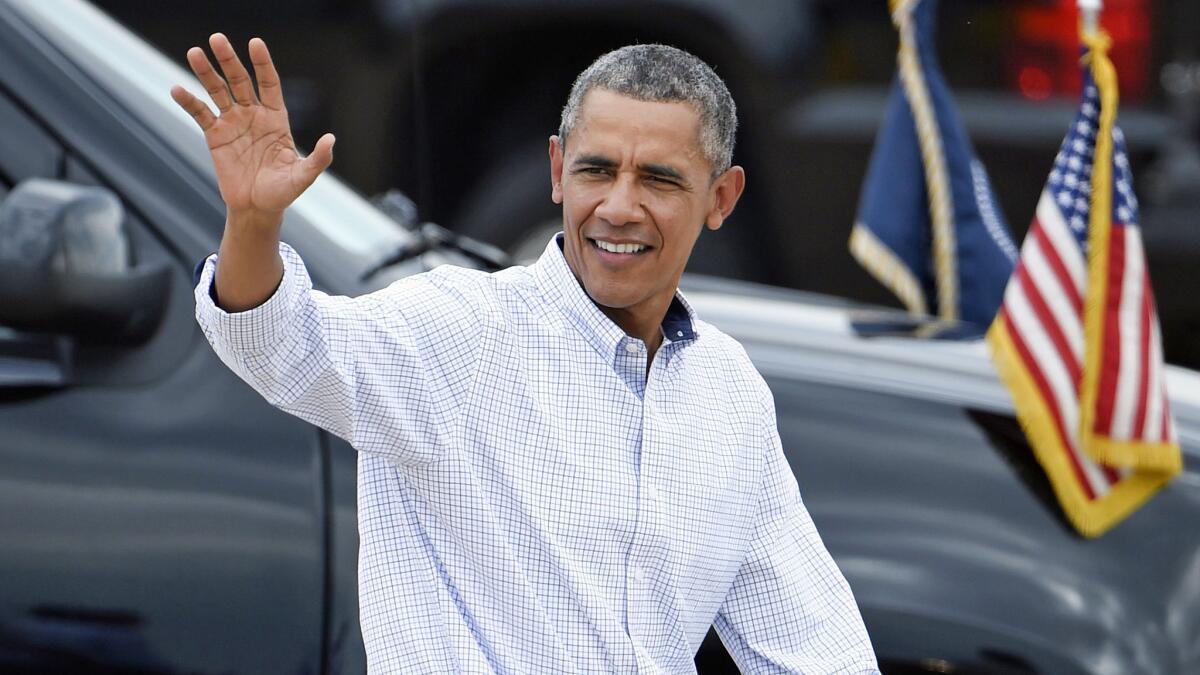
President Barack Obama waves as he leaves Marine Corps Air Station Miramar in San Diego Monday, Oct. 12, 2015. (AP Photo/Denis Poroy)
Clinton vs. Sanders? President Obama may keep his focus on Mets vs. Dodgers.
The White House said Tuesday that while President Obama is "certainly interested" in the first debate featuring the five Democrats aspiring to succeed him, it's not likely he'll watch the event "wire to wire."
"There is some pretty good playoff baseball on tonight. So I would anticipate that he may be doing a little channel surfing," Press Secretary Josh Earnest told reporters.
What Obama doesn't see live he'll no doubt catch up on in the coverage to follow, Earnest added.
"This kind of robust discussion, in public, in front of the American people, where the candidates lay out their vision and priorities for the country, is good for our democracy," Earnest said. "It's a good opportunity for the American people and voters to carefully consider the platform on which each candidate is running."
The debate is likely to begin after the fourth game of the St. Louis Cardinals-Chicago Cubs series, which is surely of interest to the Chicagoan, even if he prefers the White Sox. But it will start a few innings into the New York Mets-Los Angeles Dodgers game, where ace Clayton Kershaw will be on the mound hoping to extend the Dodgers season and force a decisive fifth game in Los Angeles on Thursday.
@HillaryClinton answers @realDonaldTrump . . .
Three things Clinton and Sanders need to do to win the debate

Democratic presidential candidates Sen. Bernie Sanders and former Secretary of State Hillary Clinton.
Is there anything Hillary Rodham Clinton can do to "win" Tuesday night's debate in Las Vegas?
Maybe not. Nobody is expecting her to deliver a knockout blow that cripples her main rival, self-described socialist Sen. Bernie Sanders of Vermont. And everyone else on the stage is so far behind Clinton -- barely registering 1% each in the polls -- that they have nothing to lose to her.
Clinton, though, has a lot to lose herself. She has been sliding in the polls, unable to shake questions about her use of a private email server while secretary of State and facing continued voter concerns about her trustworthiness.
If Tuesday night is to be a turning point, where Clinton regains her footing and starts to build new enthusiasm around her campaign, there are a few things she needs to accomplish in the debate.
And what about Sanders? Will Bern-mentum come to a halt amid his struggle to appeal to minority voters and a less-than-robust history of standing up to the National Rifle Assn.?
Today my colleague Mark Barabak and I describe the three things that Clinton and Sanders need to do to win tonight's debate.
We also take a look at the other candidates, though in their cases it's not three things they need to do Tuesday, but just one.
What you need to know about the 3 other guys on the debate stage
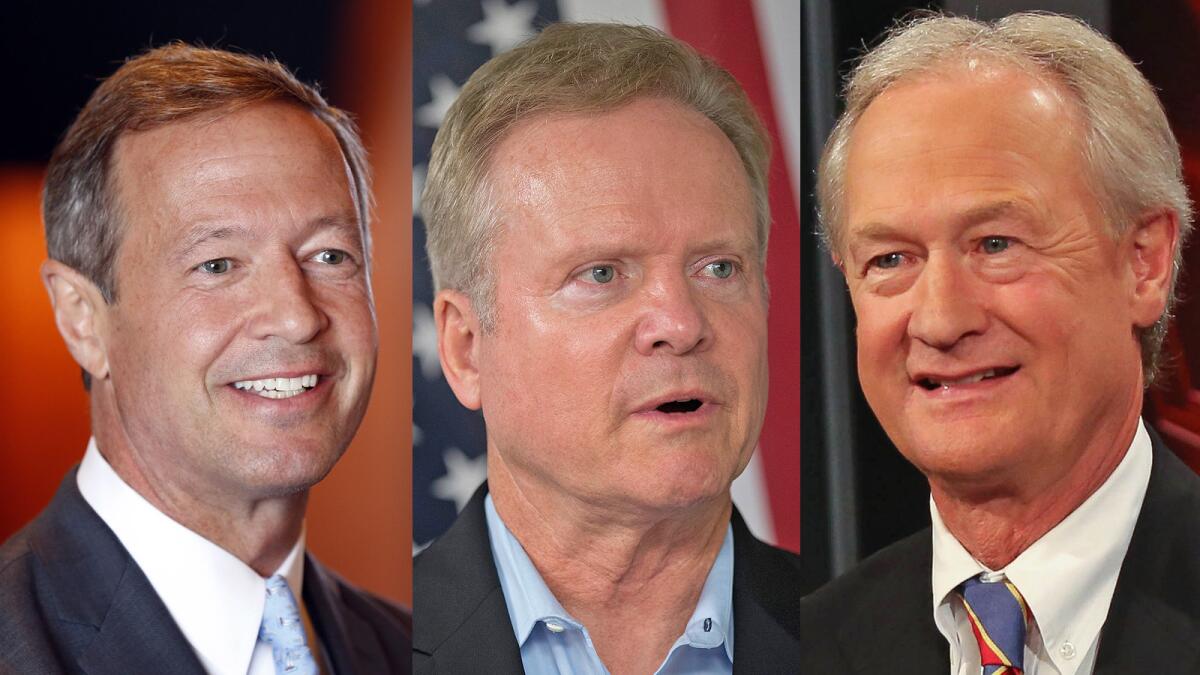
For months, Hillary Rodham Clinton has been the front-runner for the Democratic nomination for president, although Sen. Bernie Sanders of Vermont narrowed the gap over the summer and is running even or ahead of her in early polling in some states. His rise has drawn considerable attention, which, in turn, has helped increase his prominence.
Less well-known are the other three candidates they will share the stage with at Tuesday night's first Democratic presidential debate.
Former Rhode Island Gov. Lincoln Chafee, former Maryland Gov. Martin O'Malley and former Sen. Jim Webb of Virginia have each been invited to participate. Each is polling at around 1% in recent surveys.
Get up to speed quickly on who they are:
Martin O'Malley
Age: 52
Occupation: Visiting professor at Johns Hopkins University
Previous occupation: Governor of Maryland, 2007-2015
Education: Catholic University, University of Maryland School of Law
Family: Wife, Katie
Strengths: Strongly liberal record as governor included abolishing the death penalty and raising the state's minimum wage.
Weaknesses: Low name identification and an uphill battle to raise enough money to change that. Republicans won Maryland governorship after his tenure, partly because of tax increases he championed.
Issues most passionate about: Improving economy, immigration reform, criminal justice reform
What you might not know: His mother, Barbara, works for Democratic Sen. Barbara Mikulski of Maryland.
Jim Webb
Age: 69
Occupation: Author
Previous occupation: Senator from Virginia, 2007-2012
Education: U.S. Naval Academy, Georgetown Law Center
Family: Wife, Hong Le; children, Amy, Emily, Georgia, Jimmy, Julia, Sarah
Strengths: Military experience. Claims ability to work across the aisle with Republicans. Served four years in the Reagan administration as secretary of the Navy.
Weaknesses: Low name identification. Moderate to conservative views are out of step with a party that has moved left
Issues most passionate about: Improving economy, national security, criminal justice reform
What you might not know: Speaks Vietnamese
Lincoln Chafee
Age: 62
Occupation: N/A
Previous occupation: Governor of Rhode Island, 2011-2015
Education: Brown University
Family: Wife, Stephanie; children, Caleb, Louisa, Thea
Strengths: Experience in municipal, state and federal government.
Weaknesses: Low name identification and likely inability to raise enough cash to stay afloat.
Issues most passionate about: Opposition to Iraq war, immigration reform, improving economy
What you might not know: Worked as a horse farrier
This should be fun . . .
Clinton is most popular among Democrats overall; Sanders ahead among whites, college grads
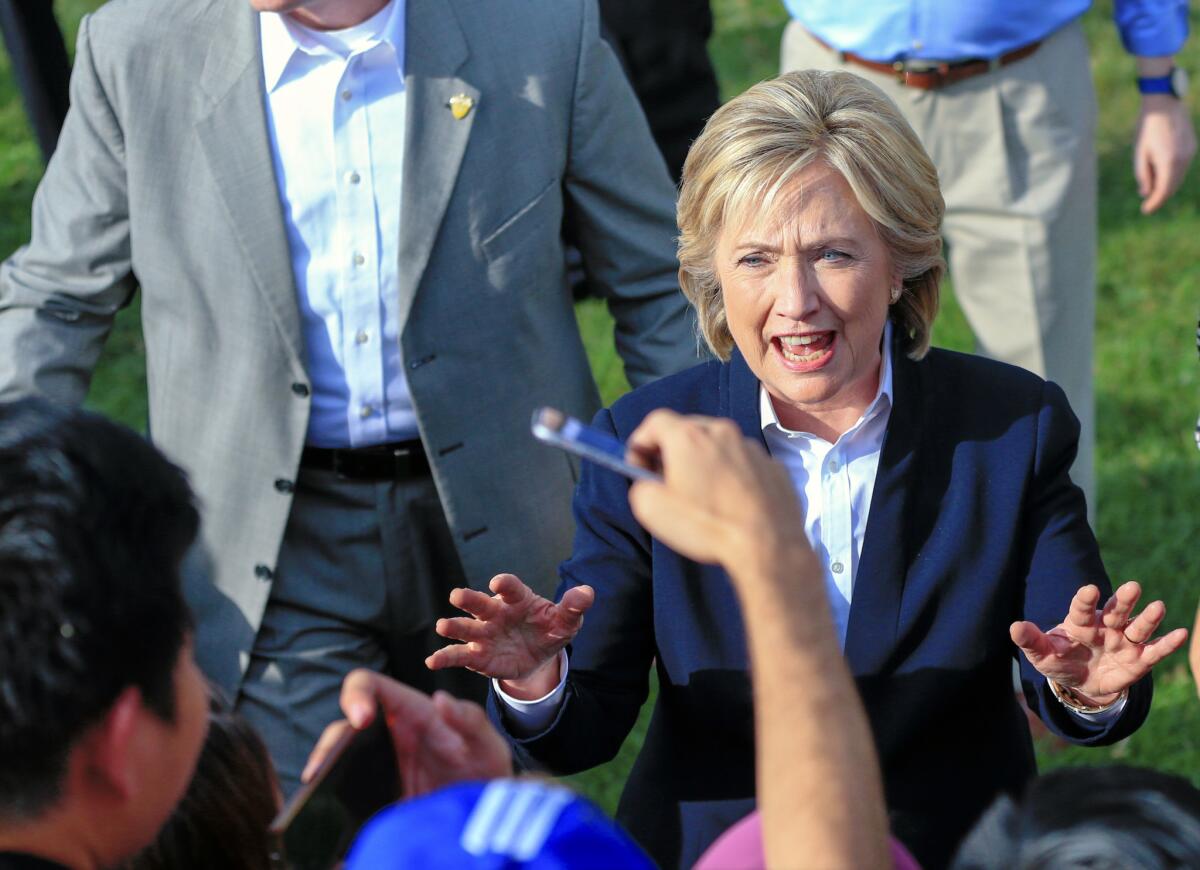
Democratic presidential candidate Hillary Rodham Clinton speaks with supporters on Oct. 7 after a campaign stop at the Westfair Amphitheater in Council Bluffs, Iowa.
As the Democratic candidates prepare for their first televised debate, Hillary Rodham Clinton, the front-runner in the race, continues to enjoy a more favorable image among her party's voters than any of her challengers, new polling shows.
A Gallup poll of nearly 6,000 Democrats and independents who lean Democratic provides an unusually detailed view of how the party's voters view their potential nominees.
Clinton has lost ground since the summer, but she still has a "net favorable" rating -- the difference between the percentage of Democrats who view her favorably and those who see her unfavorably -- of plus 52, Gallup found.
By comparison, Sen. Bernie Sanders of Vermont, her closest challenger, has a net favorable image of plus 40. His rating is lower in large part because fewer Democrats know enough about him to have an image one way or the other.
Analysis of the favorability ratings illustrates the different bases of support the two candidates depend on. Sanders has a slightly higher net favorable rating than Clinton among white Democrats, those younger than 30 and those with college degrees.
But Clinton's net favorable rating is far higher than Sanders' among blacks and Latinos, those with a high school education or less, women and voters older than 50. Her ratings are also somewhat higher among Democrats who call themselves moderates.
Among men, liberals and voters with graduate or professional degrees, the two candidates' net favorable ratings are nearly the same.
Gallup based its analysis on polling conducted between Sept. 12 and Oct. 10. The candidate ratings are based on a random subset of those polled and have a margin of error of plus or minus 4 percentage points.
5 things to watch in tonight's Democratic debate
By comparison with the reality TV series that has been the Republican presidential debate season, tonight's gathering of five Democratic candidates may seem like a quiet dinner party.
But there will be plenty happening both onstage and off, as the Democrats try to infuse their race with some of the excitement surrounding Trump and Friends.
Hillary Rodham Clinton will try to take back the narrative of her history as secretary of State, whereas Bernie Sanders -- while promising no personal attacks -- will seek to contrast his record with hers and solidify his standing as a serious contender.
The three other guys you haven't heard about so much? They're each hoping the debate will offer a moment in the spotlight.
Here are a few of the things to watch for in tonight's conversation:
By the numbers
Get the L.A. Times Politics newsletter
Deeply reported insights into legislation, politics and policy from Sacramento, Washington and beyond. In your inbox twice per week.
You may occasionally receive promotional content from the Los Angeles Times.







